The closing concert of VOCES8’s annual summer school and festival at Milton Abbey was a contribution to this year’s commemoration of the 150th anniversary of the birth of Ralph Vaughan Williams. VOCES8 were joined by the VOCES8 Scholars, and some additional singers, to present Vaughan Williams’ Mass in G Minor, a work written for Westminster Cathedral in the period directly after World War I, during which the composer had served as an ambulance driver in France. Scored for four soloists and double choir, the Mass draws on Renaissance tropes – modal scales, polyphony, false relations – alongside features such as the parallel fifths characteristic of the earlier polyphony, and is thus a sort of choral companion-piece to Vaughan Williams’ Fantasia on a Theme by Thomas Tallis for double string orchestra and string quartet.
Milton Abbey seems an ideal venue for this work – spacious enough to give resonance to the voices but not so roomy that clarity and definition are at risk of being lost. There are other risks, though, of performing with not one voice but two to a part (that is, with two SSAATTBB groups), not least how to balance and blend the two individual voices, though the relatively small forces overall allowed conductor Barnaby Smith to achieve good ensemble and precision.
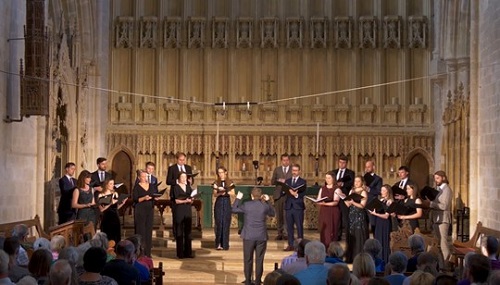
The Kyrie showcased so many of the elements of music-making at which VOCES8 excel. The altos began with confidence, the imitative entries layering and then gradually flowering, every entry clearly heard without disrupting the overall flow. The control through the long lines was excellent – one could hardly tell if the singers were taking a breath – and Smith created breadth while never allowing things to sag. The Christe section had more urgency, reflecting the ever-changing time signatures and building to the homophonic final statement. The individuality of particular voices came through, too, though in the return of the Kyrie text, blend took priority, perhaps because of the pianissimo dynamic.
The Gloria was animated – indeed, Euan Williamson’s prefatory intonation seemed rather jaunty for a Mass context– and Smith judged the overall structure well, holding back the true fortissimo for the terrifically exciting entries offering praise and thanks for the Lord’s glory, “Gratias agimus tibi propter magnam gloriam tuam”. Some nuances didn’t quite come off, though: the shift from G major to E major in the first phrase, “Et in terra pax hominibus bonae voluntatis”, wasn’t quite as stomach-fluttering as it could be, the intonation not absolutely true, though the tuning of the choirs’ thirds in the soli episode was impressively secure.
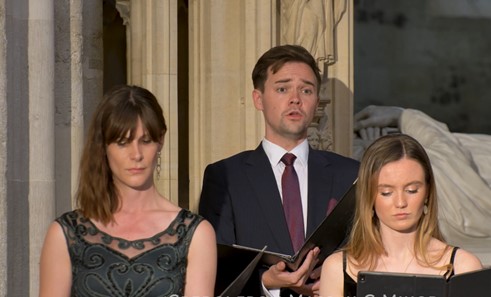
The Credo felt rather slow. It was a distinct 3-in-a-bar, rather than the single beat per bar that feels ‘right’ to my ear. This had consequences later on: the ‘Et resurrexit’ felt similarly sluggish, and there was insufficient acceleration, I felt, into the final words of the Creed, which meant that the concluding Andante was more like a Largo, and the minim beats of the final Amen seemed too deliberate, since Vaughan Williams’ changing time signatures and extending phrases suggest fluidity. That said, the ensemble sound at the close was magnificent and thrilling.
Also, while the soli section, “Et incarnatus est de Spiritu”, had an air of reverence, I sometimes wondered whether Smith needed to give more consideration to the fact that this is a declaration of faith within a liturgical context. Again, the tuning of this movement presents challenges, and I wasn’t convinced that all of the voices forming the chords found their home immediately – “Et homo factus est” (And was made man) took time to settle, for example, and the intonation was sometimes unsettled by the shifting conversations between the soli quartet and the choirs.
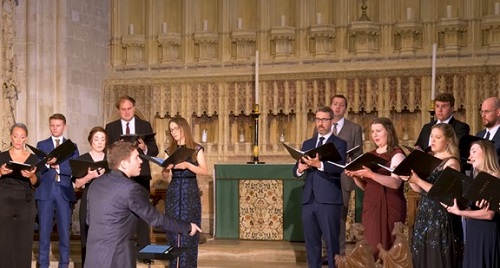
The tuning of the choirs’ thirds in the Sanctus were spot on though, and there was some lovely pianissimo gentleness here. Again, I didn’t think Smith quite judged the tempo right in the Osanna, which Vaughan Williams marks ‘Moderato maestoso’ – there was not much ‘majesty’ here, though again the sound was bright and energised. The solo singing in the Benedictus was confident and expressive, and – excepting the occasional lazy triplet – the Agnus Dei was beautifully composed.
Given that Vaughan Williams’ Mass is not of sufficient length to fill a concert, the question of how to construct a programme has to be addressed, and the option of inserting motets or other works between the movements of the Mass seems a potentially productive one. And, since Vaughan Williams marries archaism and contemporaneity, one might imagine that Renaissance motets or modern-day works might effectively complement the spirituality of the Mass. VOCES8 chose instead to present three motets by J.S. Bach, offering a contrasting seventeenth-century Germanic idiom. It seemed on paper a rather odd choice, especially since the three chosen motets all set funeral texts. The musical and aesthetic results were somewhat mixed.
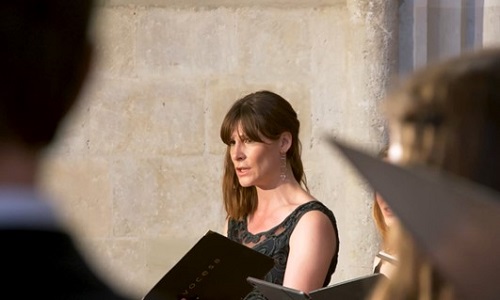
Bach’s ‘Komm, Jesu, Komm’, heard after the Kyrie, began with lithe antiphonal calls – here was the choral energy and drama that was lacking in last week’s performance of Handel’s Solomon at the Royal Albert Hall – and Barnaby Smith adopted a good tempo, one which allowed him to create a pleading tone and pointedly emphasis the text, “mein Leib is müde” (my body is weary). With the change of text, “Die Kraft verschwind’t je mehr und mehr” (My strength is failing more and more), the tempo picked up and, together with the slightly staccato articulation of the crotchets, this created a rather jolly mood. But, the singers’ German diction was uniformly good, and the angular lines of “der saure Weg wird mir zu schwer!” (the bitter path becomes too hard) were well-built, the anguish accruing. And, there was good momentum through the declaration, “Du bist der rechte Weg, die Wahrheit und das Leben” (You are the right path, the truth and the life), the occasional major tonality and the lovely lightness of the sopranos creating warmth, as Smith left room for the running motifs of the inner voices. The calm of the final aria, “Drum schließ ich mich in deine Hände” (So I give myself into your hands), and the low tessitura of the closing cadence confirmed a mood of calm and comfort at the close.
‘Fürchte dich nicht, ich bin bei dir’ (Be not afraid, I am beside you) was less successful. Interpolated after the Credo and before the Benedictus, and preceded and followed by an organ strophe (presumably to help the singers find the pitch), this motet never settled, largely because Smith’s tempo was too precipitous. Words got swallowed in the rapid passages – and thus the motto phrase, “Fürchte dich nicht”, which reappears through the motet did not make its mark. The ensemble slipped at times, and more importantly, the singers sometimes struggled to keep a sure footing through Bach’s twisting harmonic journeys. Listening to the stream online is not the same as being in the live venue, but it seemed to me that the sound was soprano-sheavy, and that stronger tenor and especially bass lines would have provided a firmer guide. It’s worth remembering that, since these motets were not intended for liturgical use, Bach provided instrumental parts to double the singers (though those for ‘Der Geist hilft’ are the only manuscripts that survive), and instrumental support would certainly have steadied and enriched the harmonies here. I also wasn’t sure why, having set off at such a lick, Smith then held back the declarations, “Ich stärke dich”, so extendedly, depriving the connecting running phrases of their purpose and weakening the broader flow of the whole.
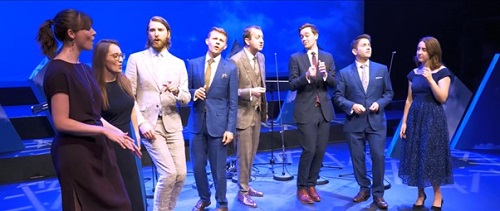
‘Der Geist hilft’ (The spirit comes to help our weakness) was performed after Vaughan Williams’ Agnus Dei. The imitation is less complex here and the counterpoint built convincingly towards the closing chorale, “Du heil Du heilige Brunst, süßer Trost” (You sacred warmth, sweet consolation). Though, again, Smith seemed in a bit of a hurry, the massed sound was glorious, the balance, line and tuning impeccable. This is what VOCES8 do best, and better than most. It seemed a strange decision, though, to follow Vaughan Williams’ quiet, meditative close with a motet of such vigour. Perhaps that’s why the ensemble offered an encore – one of their favourites: ‘Abendlied’ by Josef Rheinberger. It was beautifully sung, but I couldn’t help but think that “Dona nobis pacem”, a plea that there might be peace on earth, might have been a more apt final word.
VOCES8’s prelude to the concert was filmed during a visit to Graz, and was introduced by Barnaby Smith and tenor Euan Williamson from Chautauqua in the US. An assimilation of ‘Come fly with me’ and ‘Fly me to the Moon’, brilliantly arranged by Alexander le Strange, did, as Williamson suggested, allow every member of the group to show off their talents, and there’s no doubt they were enjoying themselves. But, it was an odd ‘warm-up’ for Vaughan Williams’ spiritual reflections.
The final concert of Summer ’22 — LIVE From London is on 28th August when VOCES8 are joined by the TUKS Camerata, an outstanding student choir from the University of Pretoria, South Africa.
All concerts from the series are available online until 18th September 2022.
Claire Seymour
Ralph Vaughan Williams – Mass in G minor, Kyrie; J.S. Bach – Komm, Jesu, Komm; Vaughan Williams – Mass in G minor, Gloria, Credo; J.S. Bach – Fürchte dich nicht, ich bin bei dir; Vaughan Williams – Mass in G minor Sanctus, Benedictus, Agnus Dei; J.S. Bach – Der Geist hilft unser Schwachheit auf
VOCES8: Andrea Haines (soprano), Molly Noon (soprano), Katie Jeffries-Harris (alto), Barnaby Smith (conductor), Blake Morgan (tenor), Euan Williamson (tenor), Christopher Moore (baritone), Jonathan Pacey (bass)
VOCES8 Scholars: Lily Allen-Dodd (soprano), Lydia Wonham (soprano), Sarah Luttrell (alto), Elizabeth Nurse (alto), Owen Elsley (tenor), Jack Harberd (tenor), Ross Cumming (bass), Sam Poppleton (bass) Additional Singers: Eleonore Cockerham (soprano), Bobbie Blommesteijn (soprano), Christopher Wardle (alto), Dominic Carver (bass)
Live from London, Milton Abbey (streamed performance); Sunday 21st August 2002.